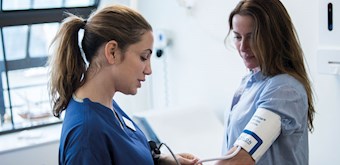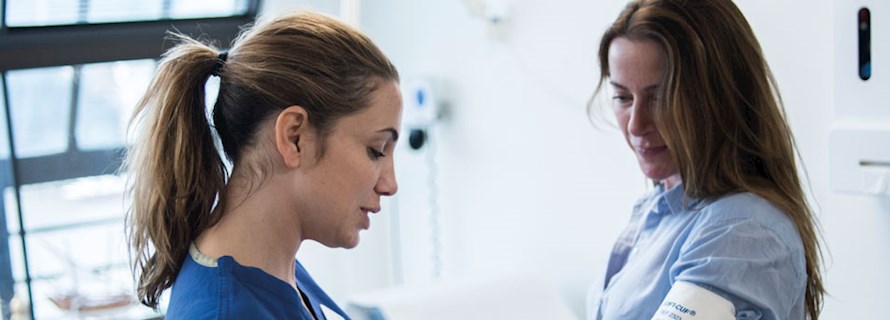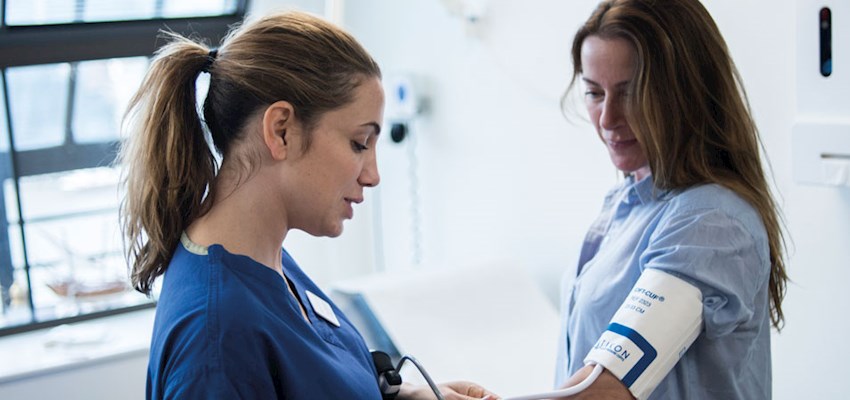Your heart muscle
Your heart is the hardest working muscle in your body. Heart muscle disease, or cardiomyopathy, can cause its walls to change shape. They can grow thicker, a condition known as hypertrophic cardiomyopathy, or they can stretch and thin, something called dilated cardiomyopathy. When this happens, the heart can’t pump blood around your body as effectively.
Symptoms include chest pain and palpitations, although some people don’t experience any at all. If a heart muscle disease is untreated, there is a small risk of cardiac arrest, when the heart is unable to beat properly.
Some cardiomyopathy is inherited. Genetic testing means you can find out whether you might be likely to develop a heart muscle disease — and get the treatment you need to manage it.
Symptoms include chest pain and palpitations, although some people don’t experience any at all. If a heart muscle disease is untreated, there is a small risk of cardiac arrest, when the heart is unable to beat properly.
Some cardiomyopathy is inherited. Genetic testing means you can find out whether you might be likely to develop a heart muscle disease — and get the treatment you need to manage it.
The consultants who specialise in cardiomyopathy
Cardiomyopathy can present itself in many different ways, in many different stages of life. That’s why our consultants specialise in inherited cardiac conditions like cardiomyopathy — and even subspecialise in particular types like Takotsubo cardiomyopathy.
Among our specialists is the consultant who advises NHS England on heart failure and inherited cardiac disease. Another consultant specialises in protecting the heart from damage during cancer treatment like chemotherapy. And they’re pioneering new technologies to transform patients’ quality of life.
Among our specialists is the consultant who advises NHS England on heart failure and inherited cardiac disease. Another consultant specialises in protecting the heart from damage during cancer treatment like chemotherapy. And they’re pioneering new technologies to transform patients’ quality of life.
Identifying and treating heart muscle disease
Screening and genetic testing
Screening and genetic testing can tell you and your family whether you carry the mutated gene known to cause heart muscle disease.
Imaging and scanning
Tests like an echocardiogram, MRI, and cardiac CT will create high-resolution images and precise measurements of your heart muscle.
Changing your lifestyle
Your consultant might recommend you reduce how much alcohol you drink, or change how much you exercise.
Medical management
Diuretics can reduce a build up of excess fluid in the body, beta-blockers can help control your heartbeat, and blood thinners can reduce the risk of clots.
Implanting a pacemaker or ICD
A pacemaker or ICD device can help your heart beat regularly. Some pacemakers can improve heart function by resynchronising the heart's pumping.
Surgery
A team of cardiac surgeons may operate to remove small amounts of diseased heart muscle. This can make it easier for your heart to pump blood around your body.
A clinic dedicated to inherited cardiac diseases
At our inherited cardiac disease clinic, consultants who specialise in cardiomyopathy, heart rhythms, and genetics work together with families who have or may be at risk of cardiomyopathy.
From genetic testing to counselling, advice and treatment, we make sure patients have everything they need to manage their disease.
From genetic testing to counselling, advice and treatment, we make sure patients have everything they need to manage their disease.




Monitoring your heart remotely
Devices like pacemakers help the heart beat regularly. They can also monitor the heart, so we can detect problems early and have a better chance of intervening. We follow up with patients in our pacemaker clinic and with home monitoring devices. These devices wirelessly connect to the pacemaker to send a reading to our clinic. A physiologist checks this reading every day, ready to contact the patient if anything looks abnormal.
Protecting the heart during cancer treatment
Some forms of chemotherapy weaken the heart muscle. We have a team of cardio-oncologists, consultants who subspecialise in protecting the heart during cancer treatment. They screen patients for cardiovascular risk before treatment, then monitor patients throughout to identify and manage any side effects that could affect the heart.
Clinical nurse specialists here to support you
We’re one of the only hospital groups to have clinical nurse specialists — nurses who specialise just like consultants, and who understand what an inherited heart disease diagnosis means, and what support patients most value.
Our cardiac hospitals
Our hospitals are internationally recognised. Our cardiac department brings together these different sites, our consultants, nurses, teams and technology. It’s all these elements combined that allow us to deliver outstanding care.
Request a cardiac appointment
If heart symptoms are affecting your quality of life, we’re here to help. Our heart team is available to book an appointment with a cardiac specialist.
Call us today
020 7616 4988